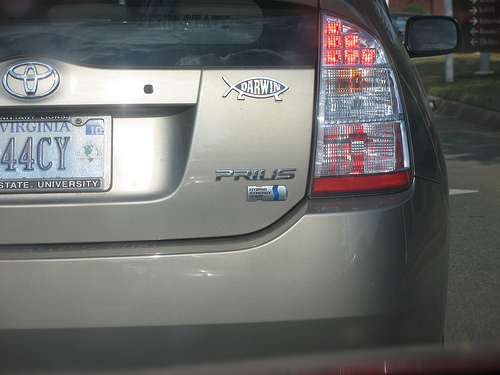 Culture & Ethics
Culture & Ethics
 Evolution
Evolution
Misunderstanding Understanding Jerry Coyne on Free Will

Jerry Coyne of Why Evolution Is True protests that I misunderstood his viewpoint on free will in a recent post. Coyne, who denies the existence of free will, had complained about a hit-and-run driver who dented his car in a parking lot.
I pointed out that, if free will is an illusion, Coyne has no justification to condemn the fellow who hit his car and drove off, because without free will the dishonest driver had no choice to do otherwise. If we lack free will, Coyne might as well complain to the manufacturer about the offending car as complain to the police about the offending driver. The driver, no less than the car, can’t be held morally responsible for an act he was not free to choose.
I observed that the moral concepts of “good” and “bad” don’t really apply to human acts unless free will is real. Without free will, morality doesn’t make any sense.
Coyne:
The statement that “‘good’ and ‘bad’ don’t really apply to humanity” is Egnor’s own mistaken characterization of my views. Of course I see actions as “good” or “bad,” based on their salubrious or deleterious effects on individuals or society.
Coyne denies that the fellow who drove off after hitting his car was morally wrong. Coyne was merely upset that the guy was insalubrious.
Approbation and disapprobation are useful social tools, for, although we have no choice about how we act, we can influence how others act by giving their behavior labels and sanctioning or rewarding them accordingly.
Coyne insists that he called the cops on the hit-and-run driver — who “had no choice about how to act” — only to label the fellow’s behavior and sanction him accordingly. Presumably, if the driver had stayed at the scene and accepted responsibility, Coyne would have offered him a biscuit or a small fish.
Indeed, I don’t believe in moral culpability: that term is without real meaning if one denies the possibility of free choice. But there can still be still “culpability” based on the effects of one’s actions. (I’d be glad to hear readers’ feelings about why we should retain the term “morality” if there is no free choice.)
“Culpability” connotes moral fault. What Coyne means by culpability is simply “effect’. Acts certainly do have effects. If there is no free will — if we are merely following instructions of one sort or another — Coyne is correct that no agent, regardless of effect, is morally culpable.
Note to Coyne: your argument was a hard sell when it was used by the defense counsel at Nuremberg.
As for my using the terms “good” and “bad” as showing a “flicker of libertarian free will,” well, that’s just wrong. It’s bad for me, and bad for society, if people are allowed to damage other people’s property and then get off scot-free. Yes, the guy who hit my car had no choice in what he did, and I had no choice about reporting him, but that doesn’t mean that it’s not useful for me to report him.
Coyne insists that hit-and-run driving is not morally wrong. He insists that nothing is morally wrong. He called the police merely because denting his car and running off was “bad.”
Coyne denies objective good and evil, so it’s unclear what he means by “bad.” Perhaps he means “ineffective in securing social cohesion.” But if there is no objective moral good or evil, how can social cohesion be good, or social fratricide be bad? When you strip reality of moral standards, nothing makes any sense.
[Egnor] — and no doubt many of his creationist colleagues — do indeed believe in libertarian free will: the “ghost in the machine,” as do many religious people.
I don’t believe in ghosts, and men aren’t machines. I do assert that man has free will. To assert otherwise is lunacy.
So those philosophers who say that few people are true libertarians are simply wrong. True libertarian free will is an essential part of many religions, and without it the foundations of faith would crack. And there are a lot of religious people. That is why I think that those philosophers who spend their time confecting ways to reconcile free will and determinism are wasting their time. There are more important jobs to do, like telling religious folks about determinism. In fact, even using the term “free will” helps enable religious belief.
Acknowledging free will is merely acknowledging the truth about man.
Coyne denies free will because free will doesn’t fit nicely with his materialist metaphysics. Rather than jettison his nonsensical metaphysics, he jettisons free will. But he has no choice to do otherwise, so you can’t blame him.
Finally, Egnor’s blathering continues to show that the people at the Discovery Institute have run out of arguments for Intelligent Design. They’ve lost the battle against evolution: they lost it in Texas, twice, they lost in at Ball State, and they’ve repeatedly lost it in court. Now, bereft of success, they’re reduced to pointing out what they see as inconsistencies or character flaws in evolutionary biologists. (Remember when they allied me with Nazis, racists, and eugenicists simply because I visited John Scopes’s grave and said I’d like to shake his hand?) But it would at least behoove them to understand what their opponents are saying before they attack them.
We are devoted to challenging philosophical materialism. Pointing out the absurdity of the denial of free will — a denial that follows naturally from philosophical materialism — is fitting and proper, and I must say that Coyne makes the refutation of philosophical materialism uncommonly easy and, rather often, entertaining.
Image: bptakoma/Flickr. The photo is for illustration purposes only. It does not depict Dr. Coyne’s car.
